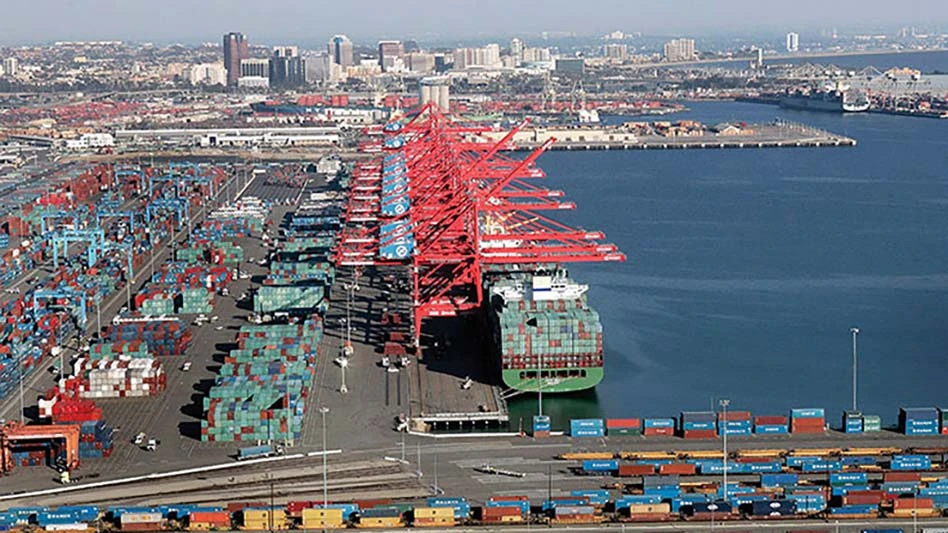
Photo courtesy of the Port of Long Beach
The United Steelworkers (USW) has led a coalition of labor organizations in filing a Section 301 petition that asks the office of the United States Trade Representative (USTR) to initiate an investigation into Chinese commercial shipbuilding.
Section 301 of the Trade Act of 1974 allows the USTR to investigate and take action to enforce U.S. rights under trade agreements or respond to unwelcome foreign trade practices, according to the Congressional Research Service.
The Pittsburgh-based labor union says the government of China, in addition to supporting shipbuilding, has enacted a comprehensive strategy to dominate global transportation and logistics networks, including employing an array of nonmarket policies.
Freight shipbuilding is a steel- and metals-intensive activity, and China’s rise to become the world’s largest shipbuilder over the past two or three decades has risen in tandem with its status as the world's largest producer of steel and other metals.
During the same time frame, the USW says U.S. shipbuilding capacity continues to diminish.
“The United States once had nearly 30 major shipyards; now we’re down to just a handful,” USW International President David McCall says. “That correlates with more than 70,000 lost shipbuilding jobs, not to mention all the secondary jobs the industry supports.”
A single commercial ship can require approximately 13,000 tons of structural steel, 60,000 gallons of paint, 130 miles of aluminum or copper electrical cable and many other products tens of thousands of USW members produce, the union says.
Beyond construction and shipyard activity, the USW says China’s reach also has deepened in the ocean freight sector.
“China is using commercial shipbuilding to dominate the full spectrum of global trade, choking out all competitors,” McCall says. “If we do not act quickly, we will soon be dependent on China not only for the products their vessels bring into our ports but also for the ships themselves.”
The 137-page petition delves into Chinese support for the sector as spelled out in several recent five-year plans published by China’s government. It also mentions China’s government promotion of a logistics software and tracking platform called Logink, used at a growing number of ports around the world.
USTR Ambassador Katherine Tai has responded quickly to the Section 301 petition. “We have seen the PRC create dependencies and vulnerabilities in multiple sectors, like steel, aluminum, solar, batteries and critical minerals, harming American workers and businesses and creating real risks for our supply chains,” she says. “I look forward to reviewing this petition in detail.”
McCall says in addition to the economic consequences of China’s policies, a growing imbalance in shipbuilding also threatens U.S. national security.
“Rebuilding our merchant marine [fleet] is not only essential to increasing our nation’s sealift capability, it will help shore up the critical supply chains our military and commercial shipbuilding industries share, making us safer and more resilient,” McCall says.
Other unions joining the USW in filing the trade petition include the International Association of Machinists and Aerospace Workers, the International Brotherhood of Boilermakers, the International Brotherhood of Electrical Workers and the Maritime Trades Department of the AFL-CIO.
At least two U.S. senators, Democrat Tammy Baldwin of Wisconsin and Democrat Bob Casey of Pennsylvania, have sent letters to the Biden administration in support of the trade petition, according to the USW.
Latest from Recycling Today
- BMW Group, Encory launch 'direct recycling’ of batteries
- Loom Carbon, RTI International partner to scale textile recycling technology
- Goodwill Industries of West Michigan, American Glass Mosaics partner to divert glass from landfill
- CARI forms federal advocacy partnership
- Monthly packaging papers shipments down in November
- STEEL Act aims to enhance trade enforcement to prevent dumping of steel in the US
- San Francisco schools introduce compostable lunch trays
- Aduro graduates from Shell GameChanger program





